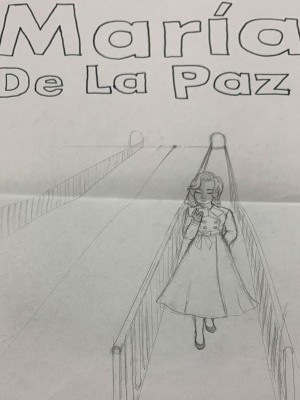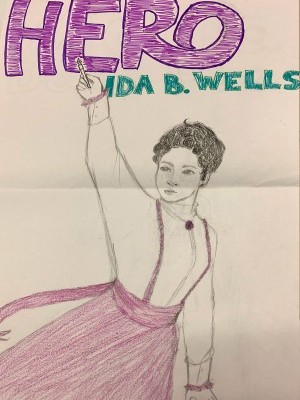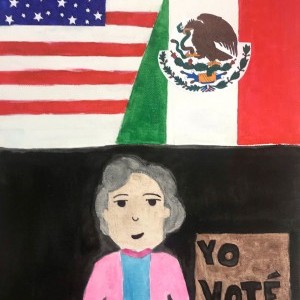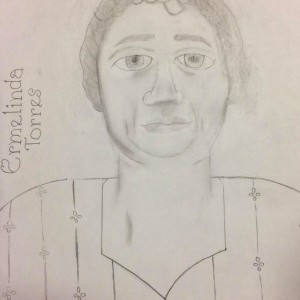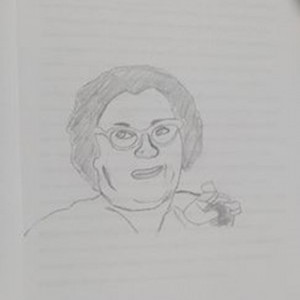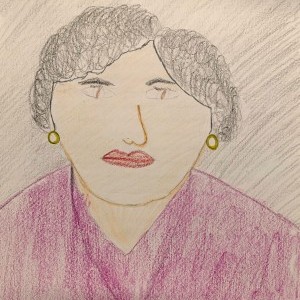Brianna Gonzalez
García Early College High School | Laredo, TX | 10th Grade
Inspirational Family Member
My Great-Grandmother
This is the story of how my great-grandmother was granted the right to vote. The year was 1957 when she became a citizen of the United States. Her name was Maria de la Paz. She was born in Nuevo Laredo, Tamaulipas, in a small colony named Hidalgo in the year 1934. She came to the United States and met up with her husband, Everardo Lara, in the mid 1900’s. They were in their early twenties when they officially moved to Laredo, Texas. She crossed the bridge when no documentation was needed. My family still tells stories about how the bridge connecting Laredo and Nuevo Laredo was never a barrier, but a way people would travel and connect with family without any restrictions. She came in search for a better life like all the other people who come to the United States.
My great grandmother wanted to work and fit in. She found jobs cleaning and cooking for wealthy families in the area. She soon realized that in order to make a difference, she needed to become a more active citizen in Laredo. She then applied for citizenship. She went through the whole process and became an official U.S. citizen in mid 1957. From what I am being told from my great-grandfather Everardo, she quickly learned to read, write, and speak English. She then encouraged her other seven siblings to do the same. They all became very active in the community and became exemplary citizens. She was a strong participant in church, helped serve her community with food and housing activities.
In those times, my great-grandmother was probably considered an activist. My great-grandmother had her first child in the year 1961, she then had three more children, one of them being my grandmother born in the year 1964. I was informed that she loved living in a country where no man or government could restrict her from her activities. She was a strong and very independent women. She enjoyed exercising her right to vote. I do not know the official she would have voted for first since there are no artifacts from when she first voted. However, every generation in my family since anyone can remember has supported the Democratic Party. I don’t know how she must have felt but I hope she wasn’t disappointed with the outcome.
Historical Figure I Admire
Ida B. Wells
Ida Bell Wells was born on July 16, 1862, in Holly Springs, Mississippi. Ida B Wells was a African American journalist; she led an Anti-Lynching campaign, this was an organized public effort to stop the practice of Lynching — lynching was used as a tool to restrain African American.
To begin with, Wells' actual first preeminent opposition had nothing to do with discrimination. In 1878, Mississippi’s Delta was stricken by a plague named “Yellow Fever”. Both her parents passed away trying to help others who were suffering from the epidemic, they died within 24 hours of each other. She and her three other siblings were left orphans. The thing that motivated Wells to take risks was a violent episode that happened close to home which intensified her attentiveness to the violence towards African Americans. Three of her close friends were lynched in 1892. Another reason she challenged the status quo was that she was dismissed from the Memphis school district after she wrote an article stating unequal pay for black schools; since then she had been an outspoken and courageous advocate for civil rights and women’s rights. These are some of the many factors that motivated Wells to contribute to her time.
A way that Wells’ contribution helped change the course of others’ lives today is through her journalism. She inspired the Ida B Wells Society which was created for investigating reporting. A way that Ida B Wells inspired future generations was when she was riding the train and was asked to move from the ladies’ car to the smoking car. She refused and was forcibly removed from the train by three men; however, she quickly hired a lawyer and created a lawsuit against the railroad and was given 500 dollars in damages. This is why she is considered to be the original Rosa Parks. Even though the decision was overturned, she spent the rest of her life as a journalist and a campaigner against racism. Now there are around 300,000 reporters and editors, whom more than half are women and about 5 percent are African American.
In addition, Ida B Wells was not aware that she was paving the way for generations to come, all she wanted was justice and equality for African Americans and women. A sacrifice that Wells had to make was moving from Memphis to Chicago because her editorials caused an indignation among the Caucasian community and her life was threatened, which caused her to flee to Chicago. Well’s work inspired the passing of the Presidential and Municipal Bill, which gave women over the age of 21 partial voting rights. Meaning they could only vote in presidential and Municipal elections.
In conclusion, we recognize Ida B Wells for her journalistic talent, for her efforts on raising awareness on lynching, and for her courage in enlarging colored women’s opportunities during the suffrage movement. Wells also ran for the Illinois Legislature, at age sixty-eight, becoming the first African American woman to run for office; however, she passed away a year later on March 25, 1931, in Chicago, Illinois. Her cause of death was uremia the term for kidney disease.
SOURCES +
What the Project Means to Me
Ida B Wells was not aware that she was paving the way for generations to come, all she wanted was justice and equality for African Americans and women.
Explore the Archive
More From This Class
Click on the thumbnails below to view each student's work.Deadline Extended
There's still time to join Women Leading the Way.
Become a part of our storytelling archive. Enroll your class today.
Join the Project

